-
 Bitcoin
Bitcoin $88,575.4133
1.33% -
 Ethereum
Ethereum $1,623.1195
-0.94% -
 Tether USDt
Tether USDt $1.0000
0.01% -
 XRP
XRP $2.1040
-0.96% -
 BNB
BNB $605.9509
0.36% -
 Solana
Solana $139.9862
-0.01% -
 USDC
USDC $1.0000
0.00% -
 Dogecoin
Dogecoin $0.1637
1.09% -
 TRON
TRON $0.2482
1.98% -
 Cardano
Cardano $0.6392
-1.18% -
 Chainlink
Chainlink $13.3059
-1.43% -
 UNUS SED LEO
UNUS SED LEO $9.0739
-4.00% -
 Avalanche
Avalanche $20.1274
-2.31% -
 Stellar
Stellar $0.2484
-4.08% -
 Sui
Sui $2.3116
2.05% -
 Shiba Inu
Shiba Inu $0.0...01252
-0.73% -
 Toncoin
Toncoin $2.9119
-3.20% -
 Hedera
Hedera $0.1725
0.04% -
 Bitcoin Cash
Bitcoin Cash $346.0750
1.19% -
 Hyperliquid
Hyperliquid $18.2428
0.88% -
 Litecoin
Litecoin $79.3117
-2.01% -
 Polkadot
Polkadot $3.7471
-4.36% -
 Dai
Dai $1.0000
0.00% -
 Bitget Token
Bitget Token $4.4341
-0.56% -
 Ethena USDe
Ethena USDe $0.9992
0.00% -
 Pi
Pi $0.6353
0.33% -
 Monero
Monero $216.8188
0.48% -
 Pepe
Pepe $0.0...08105
3.48% -
 Uniswap
Uniswap $5.3764
-1.05% -
 OKB
OKB $51.0901
0.18%
What is the fee structure of a cryptocurrency ETF?
Understanding the complex fee structure associated with cryptocurrency ETFs is essential for investors to make informed decisions that align with their financial goals and risk tolerance.
Feb 20, 2025 at 04:43 pm
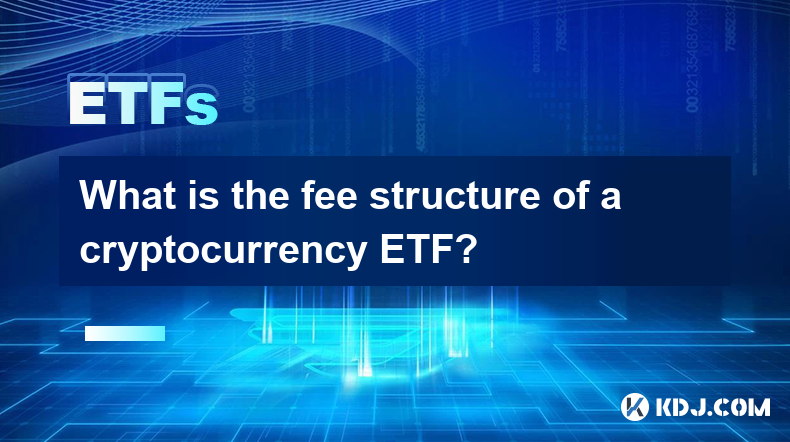
Key Points:
- A cryptocurrency ETF incurs various fees throughout its lifecycle.
- The fee structure can vary significantly among different ETF providers.
- Understanding the fee structure is crucial for investors to make informed decisions.
Understanding the Fee Structure of a Cryptocurrency ETF:
1. Management Fees:
- Management fees are annual charges levied by the ETF provider for managing the fund.
- These fees cover portfolio management, operational costs, and administrative expenses.
- Typical management fees for cryptocurrency ETFs range from 0.25% to 1.00% of the fund's assets under management (AUM).
2. Custodian Fees:
- Custodian fees are paid to the institution that holds and secures the underlying cryptocurrency assets of the ETF.
- These fees typically range from 0.05% to 0.25% of the AUM annually.
3. Transaction Fees:
- Transaction fees are incurred when the ETF buys or sells underlying cryptocurrency assets.
- These fees vary depending on the frequency of trading and the underlying exchange's fee schedule.
4. Index Licensing Fees:
- Some cryptocurrency ETFs track and follow a specific cryptocurrency index.
- Index providers charge licensing fees to ETF providers for the right to use their index as the basis of the fund.
5. Operating Expenses:
- Operating expenses cover miscellaneous costs associated with running the ETF, such as legal and compliance expenses, marketing, and distribution.
- These fees typically amount to a small percentage of the AUM (less than 0.10%).
6. Performance-Based Fees:
- Certain cryptocurrency ETFs may charge performance-based fees if they exceed a predefined benchmark or target.
- These fees incentivize the fund manager to generate returns that exceed the benchmark.
7. Redemption Fees:
- Some ETFs may charge a redemption fee if investors choose to sell their ETF shares within a specified period (e.g., within 90 days of purchase).
- These fees are typically designed to discourage short-term trading and protect the fund's stability.
FAQs:
1. What is the difference between expense ratios and management fees?
- Expense ratios represent the total annual cost of operating the ETF, including management fees, operating expenses, and index licensing fees.
- Management fees are only a component of the expense ratio.
2. How do I find out the fee structure of a cryptocurrency ETF?
- ETF providers typically disclose their fee structures in the fund's prospectus or fact sheet.
- Investors can also compare fees among different ETFs using resources such as ETF comparison websites.
3. Is there a way to minimize the fees I pay on cryptocurrency ETF investments?
- Consider ETFs with lower expense ratios.
- Choose ETFs that charge minimal transaction fees.
- Avoid ETFs with performance-based fees if you do not expect them to outperform the benchmark.
Disclaimer:info@kdj.com
The information provided is not trading advice. kdj.com does not assume any responsibility for any investments made based on the information provided in this article. Cryptocurrencies are highly volatile and it is highly recommended that you invest with caution after thorough research!
If you believe that the content used on this website infringes your copyright, please contact us immediately (info@kdj.com) and we will delete it promptly.
- British drug gang makes its own crypto to launch money
- 2025-04-22 18:50:12
- US Bitcoin ETFs Record Their Largest Daily Inflows Since January
- 2025-04-22 18:50:12
- Days before his 2025 inauguration, President Donald Trump announced the launch of his meme coin, a form of cryptocurrency.
- 2025-04-22 18:45:12
- XRP Community Figures Highlight Final Deadlines for SEC Decisions on Multiple Spot-Based XRP ETF Applications
- 2025-04-22 18:45:12
- Is It Time to Throw $1,000 Into Raydium Right Now? RAY Price Outlook
- 2025-04-22 18:40:12
- Mantra Burns 300 Million OM Tokens, Equivalent to 16.5% of the Total Supply
- 2025-04-22 18:40:12
Related knowledge
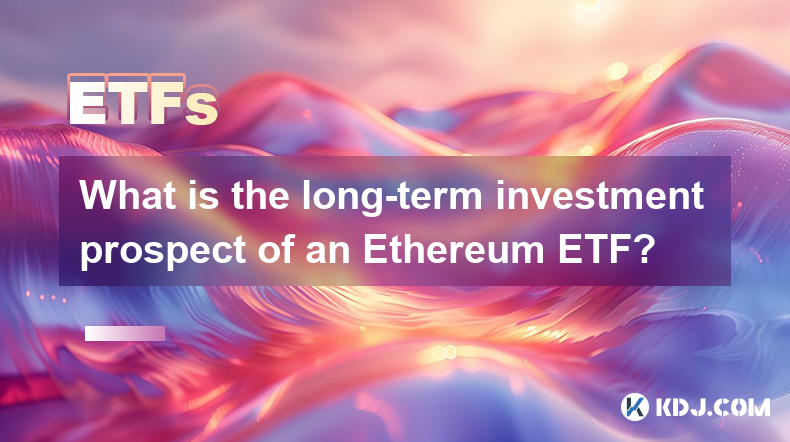
What is the long-term investment prospect of an Ethereum ETF?
Mar 18,2025 at 03:01pm
Key Points:Uncertainty surrounds the long-term prospects of an Ethereum ETF due to regulatory hurdles and market volatility.Approval hinges on regulatory clarity regarding cryptocurrencies, especially concerning investor protection and market manipulation.Successful ETF launches could boost Ethereum's price and adoption, but failure could negatively imp...
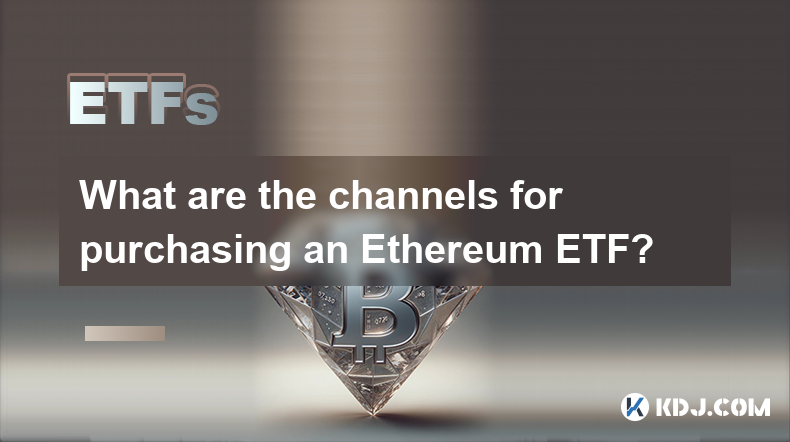
What are the channels for purchasing an Ethereum ETF?
Mar 18,2025 at 01:49am
Key Points:Currently, there are no Ethereum ETFs available for direct purchase by the general public in most major markets.Access to Ethereum exposure through ETFs is limited, mainly through futures-based ETFs.Purchasing Ethereum directly or through other investment vehicles remains a viable alternative.Regulatory hurdles and market complexities signifi...
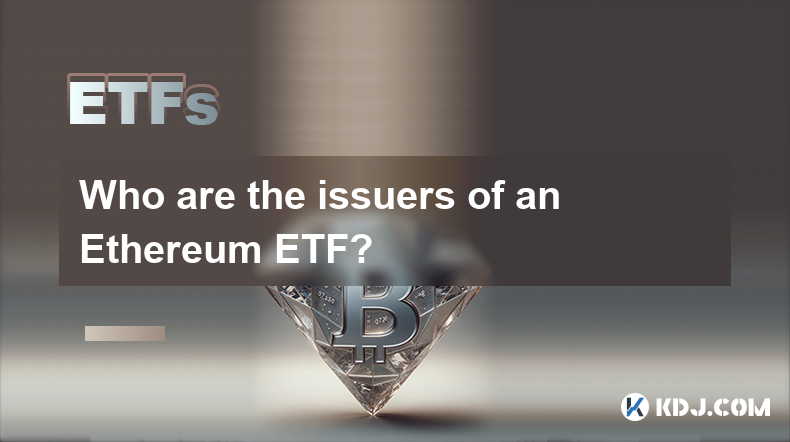
Who are the issuers of an Ethereum ETF?
Mar 19,2025 at 08:07pm
Key Points:There are no currently approved Ethereum ETFs in the US, meaning no single issuer can be definitively named. However, several firms have filed applications.The issuers of potential Ethereum ETFs will be large, established financial institutions, typically asset management companies.The specific requirements for ETF issuers are stringent and o...
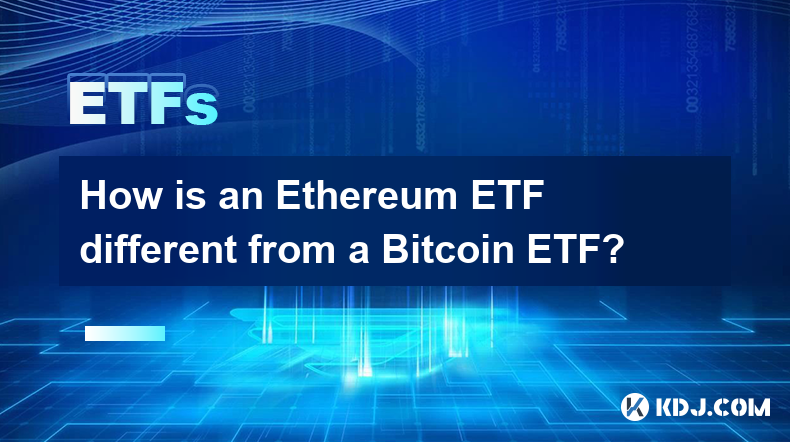
How is an Ethereum ETF different from a Bitcoin ETF?
Mar 17,2025 at 10:55am
Key Points:Underlying Asset: The core difference lies in the underlying asset: an Ethereum ETF tracks the price of Ether (ETH), while a Bitcoin ETF tracks the price of Bitcoin (BTC).Technology and Use Cases: Ethereum's blockchain supports smart contracts and decentralized applications (dApps), creating a distinct technological and investment narrative c...
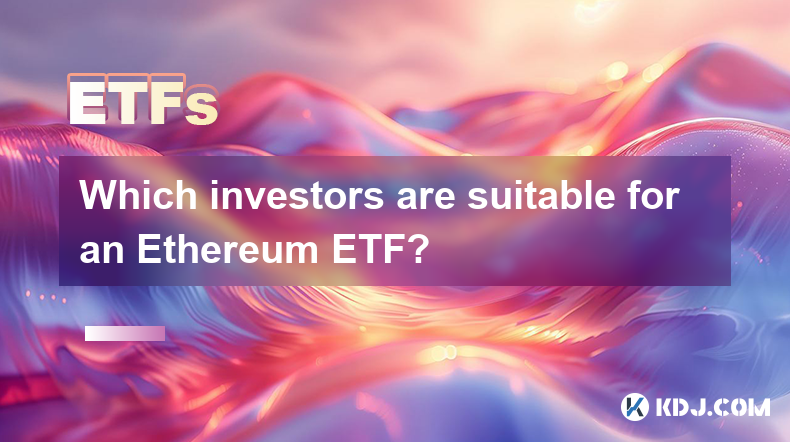
Which investors are suitable for an Ethereum ETF?
Mar 16,2025 at 05:50pm
Key Points:Risk Tolerance: Ethereum ETF investment requires a high risk tolerance due to the volatility of the cryptocurrency market.Investment Goals: Investors seeking long-term growth potential and exposure to the Ethereum ecosystem are suitable candidates.Investment Horizon: A longer-term investment horizon is crucial to weather market fluctuations.U...
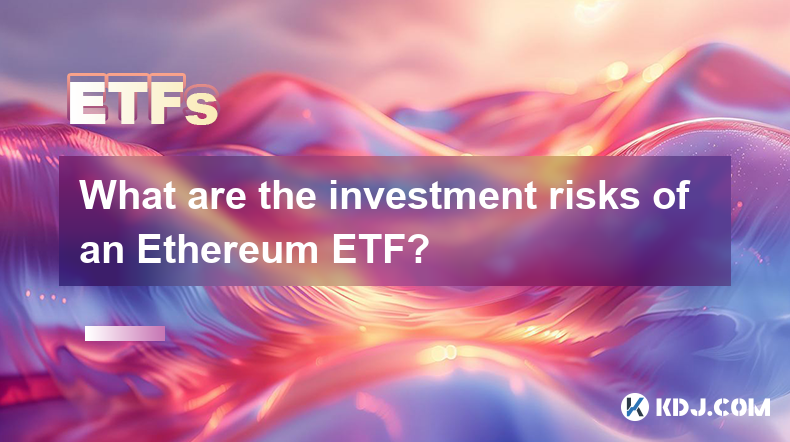
What are the investment risks of an Ethereum ETF?
Mar 18,2025 at 02:12am
Key Points:Price Volatility: Ethereum's price is highly volatile, impacting ETF share prices.Regulatory Uncertainty: Changes in regulatory landscapes can significantly affect ETF trading and performance.Market Manipulation: The potential for market manipulation, particularly in smaller ETFs, exists.Underlying Asset Risk: Risks associated with the Ethere...

What is the long-term investment prospect of an Ethereum ETF?
Mar 18,2025 at 03:01pm
Key Points:Uncertainty surrounds the long-term prospects of an Ethereum ETF due to regulatory hurdles and market volatility.Approval hinges on regulatory clarity regarding cryptocurrencies, especially concerning investor protection and market manipulation.Successful ETF launches could boost Ethereum's price and adoption, but failure could negatively imp...

What are the channels for purchasing an Ethereum ETF?
Mar 18,2025 at 01:49am
Key Points:Currently, there are no Ethereum ETFs available for direct purchase by the general public in most major markets.Access to Ethereum exposure through ETFs is limited, mainly through futures-based ETFs.Purchasing Ethereum directly or through other investment vehicles remains a viable alternative.Regulatory hurdles and market complexities signifi...

Who are the issuers of an Ethereum ETF?
Mar 19,2025 at 08:07pm
Key Points:There are no currently approved Ethereum ETFs in the US, meaning no single issuer can be definitively named. However, several firms have filed applications.The issuers of potential Ethereum ETFs will be large, established financial institutions, typically asset management companies.The specific requirements for ETF issuers are stringent and o...

How is an Ethereum ETF different from a Bitcoin ETF?
Mar 17,2025 at 10:55am
Key Points:Underlying Asset: The core difference lies in the underlying asset: an Ethereum ETF tracks the price of Ether (ETH), while a Bitcoin ETF tracks the price of Bitcoin (BTC).Technology and Use Cases: Ethereum's blockchain supports smart contracts and decentralized applications (dApps), creating a distinct technological and investment narrative c...

Which investors are suitable for an Ethereum ETF?
Mar 16,2025 at 05:50pm
Key Points:Risk Tolerance: Ethereum ETF investment requires a high risk tolerance due to the volatility of the cryptocurrency market.Investment Goals: Investors seeking long-term growth potential and exposure to the Ethereum ecosystem are suitable candidates.Investment Horizon: A longer-term investment horizon is crucial to weather market fluctuations.U...

What are the investment risks of an Ethereum ETF?
Mar 18,2025 at 02:12am
Key Points:Price Volatility: Ethereum's price is highly volatile, impacting ETF share prices.Regulatory Uncertainty: Changes in regulatory landscapes can significantly affect ETF trading and performance.Market Manipulation: The potential for market manipulation, particularly in smaller ETFs, exists.Underlying Asset Risk: Risks associated with the Ethere...
See all articles























































































